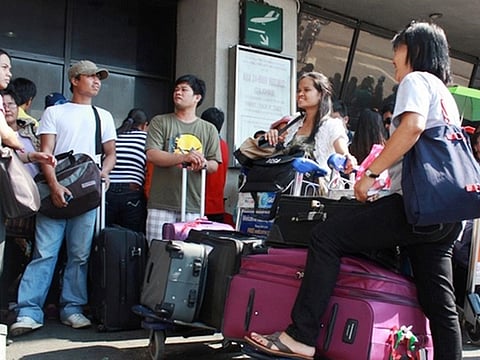OFWs can fly even if they don't pay 3% to PhilHealth, as membership voluntary, says Duterte spokesman
Expat Filipino won't be barred from travel even if they don't pay premium to state insurer

Highlights
- It's not clear whether the solution is a tempory relief, or permanent
- It's not immediatley clear if Duterte's order amounts to a veto of the law he signed last year
- Overseas Filipino workers (OFWs) form one of biggest blocs who overwhelmingly voted for Duterte in 2016
Dubai: Coverage with state insurer PhilHealth for expat Fiipinos will now be voluntary, Philippine President Rodrigo Duterte has ordered on Monday, following concerns aired by many already reeling from the pandemic.
It means no agency can prevent any Filipino overseas worker from flying out of the country even if they're not up to date with their contributions to the state insurer.
A Philippine law signed by Duterte in February 2019 mandates every Filipino expatriate worker to pay a monthly premium equivalent to 3% of their salary to the Philippine Health Insurance Corporation (PhilHealth) this 2020.
The rate goes higher in subsequent years, till it reaches 5% in 2024.
By law, PhilHealth covers all Filipinos, those overseas and dependents living with them. On April 22, the state-owned health insurer published a circular explaining the tiered contributions.
On Monday (Mau 4, 2020), Harry Roque, the presidential spokesperson said Duterte directed PhilHealth to make the premium contribution of overseas workers voluntary, according to Philippine media reports.
What does this mean?
This means oveseas Filipino workers will be allowed to leave the country even if they don't pay the 3% PhilHealth premium now.
It's not clear whether the solution is a tempory relief, or permanent. It's also not immediatley clear if Duterte's order amounts to a veto of the law he signed last year.
Overseas Filipino workers (OFWs) form one of biggest blocs that overwhelmingly voted for Duterte in 2016.
The premium is based on tiered payments: This year, it's 3%. It then gradually increases each year to 3.5% in 20201, 4% in 2022, 4.5% in 2023, 5% in 2024 and 2025.
Overseas Filipinos raised alarm bells and many signed an online petition for relief upon learning about what they felt was undue financial burden, especially because the law provides for penalties upon failure to pay.
The circular, signed by PhilHealth CEO/President Ricardo Morales, explained that under Republic Act 11223, all overseas Filipinos working or residing overseas, including those who are on holiday or waiting for their overseas work documents, whether they are unregistered or registered with the National Health Insurance Program (NHIP), are mandated to pay PhilHealth premium.
During the Monday press briefing, Roque said in Tagalog language that Duterte had “issued a directive to PhilHealth to make the membership of OFWs voluntary.”
OFWs vented their anger over the PhilHealth premium issue on social media.
PhilHealth not required for OEC issuance
Following Duterte's order, Roque explained that the Philippine Overseas Employment Agency and the Overseas Workers Welfare Administration will no longer require departing OFWs to pay PhilHealth premiums for the issuance of their Overseas Employment Certificate (OEC) that would allow them to leave the country.
Universal Health Care (UHC) Law (RA 11223)
On February 20, 2019, the Universal Health Care (UHC) Bill was signed into law (Republic Act No. 11223) by President Rodrigo Duterte. It automatically lists all Filipino citizens in the National Health Insurance Programme (NHIP).
Many Filipino migrant workers said the monthly contribution — alongside penalties over failure to pay — is a huge burden and is ill-timed as many said they are already facing pay or outright job cuts due to the coronavirus pandemic.
Sign up for the Daily Briefing
Get the latest news and updates straight to your inbox





